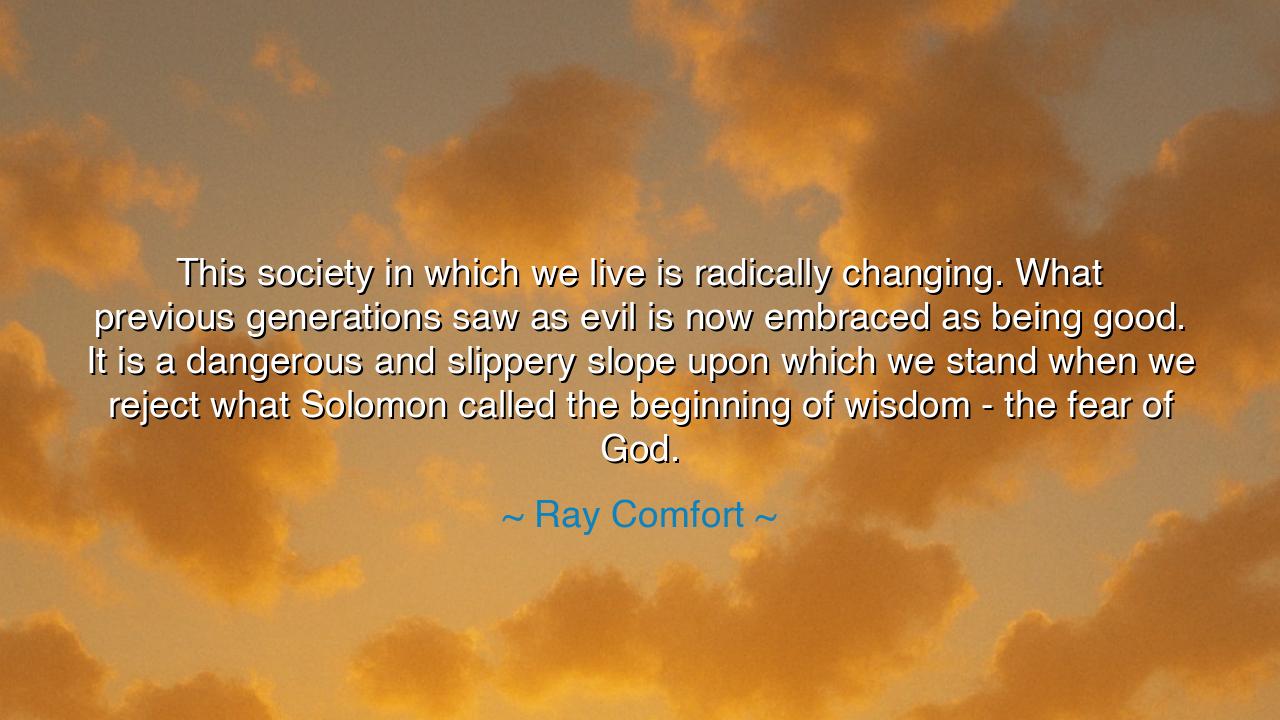
This society in which we live is radically changing. What
This society in which we live is radically changing. What previous generations saw as evil is now embraced as being good. It is a dangerous and slippery slope upon which we stand when we reject what Solomon called the beginning of wisdom - the fear of God.






The words of Ray Comfort resound like a trumpet of warning: “This society in which we live is radically changing. What previous generations saw as evil is now embraced as being good. It is a dangerous and slippery slope upon which we stand when we reject what Solomon called the beginning of wisdom—the fear of God.” Here is the cry of one who sees the moral compass of humanity shifting, the ancient anchors cast aside, and the eternal foundations threatened by the pride of man.
The fear of God, as Solomon declared, is not terror but reverence—the acknowledgment of a higher law above the will of men. It is the recognition that truth is not invented by culture, nor swayed by fashion, but rooted in the eternal. Comfort’s warning is that when a society casts off this reverence, declaring light to be darkness and darkness to be light, it begins its descent upon a path that cannot hold, for no civilization can endure when its values are untethered from truth.
History bears witness to this cycle. In the last days of Rome, vices once condemned became celebrated, and discipline was cast aside for indulgence. Gladiatorial slaughter, debauchery, and corruption grew rampant as the empire’s heart decayed. Rome had wealth, armies, and dominion, yet it lacked wisdom—and so it crumbled from within. Comfort echoes this ancient lesson: when generations abandon the foundations of morality, collapse is not far behind.
Yet his words are not only judgment but counsel. He points to Solomon, whose writings in Proverbs declare that the fear of the Lord is the beginning of wisdom. This fear is the humility of man before the Eternal, the admission that human hearts are frail and prone to folly. When society rejects this posture, it is left to its own desires, and what was once evil becomes paraded as virtue. The slope grows steeper, the fall swifter.
Therefore, let this teaching endure: do not be deceived by the shifting voices of the age, for they call good what is destructive and evil what is holy. Hold fast to the ancient wellspring of wisdom, the reverence of God, which guides the soul when all else falters. Comfort’s words, echoing Solomon’s wisdom, call us to stand firm amidst the changes of time, remembering that civilizations endure not by wealth or armies, but by righteousness and fear of the Almighty.






DNDuc Ngo
The tone here feels urgent, almost prophetic, and it makes me question whether the speaker is calling for restoration or resistance. Are we meant to turn back to old moral codes, or to reinterpret them for a new age? The tension between traditional faith and modern ethics is so complex. How can people engage in meaningful dialogue about morality without immediately clashing over ideology?
DQDiem Quynh
This perspective challenges me to think about how faith interacts with culture. If we really are on a ‘slippery slope,’ what’s the best way to address it—through personal conviction, public policy, or education? I also wonder how one maintains spiritual integrity in a pluralistic world where not everyone shares the same foundation of belief. Is fear of God still relevant as a universal moral anchor?
TLTram Luu
There’s definitely truth in observing how societal values shift over time, but I wonder if nostalgia for the past sometimes makes us idealize earlier generations unfairly. Every era has had moral blind spots. Maybe instead of fearing change, we should be asking what new forms of wisdom are emerging. Can reverence for God and openness to progress coexist without one undermining the other?
-106. Dung - 12a12
The idea that society is moving away from divine wisdom resonates with a lot of people, but it also raises tough questions. Is fear of God really the only foundation for morality? What about those who live ethical, compassionate lives without religious belief? I’d be curious to explore whether moral order can exist independently of spiritual faith, or if one truly depends on the other.
CNCuong Nguyen
This quote feels like a warning about moral relativism, and I can understand the concern. But I wonder—how do we actually define what’s ‘evil’ or ‘good’ in a world with so many cultural and personal perspectives? Isn’t it possible that what seems like moral decay to one generation is actually moral progress to another? It’s hard to know whether change always means corruption, or sometimes just evolution.